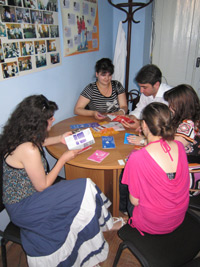News
Delivering Youth Friendly Health Information and Services in Georgia
- 21 July 2011
News
GORI, Georgia — On a recent afternoon, a group of college students were sitting around a table engaged in an unusual activity: they were having an earnest conversation about sexual health. The subject matter raised the occasional shy smile, but the students' attentiveness and willingness to participate was a clear indication of their interest.
Archil Jolashvili, a fellow university student, was leading the discussion at this Youth-Friendly Reproductive Health Centre in Gori, a city in eastern Georgia. As a youth peer educator trained by UNFPA, Archil often leads discussions like this.
"The numbers of students has grown steadily since we opened," he said after the session. "They don't come just because they have problems; they are coming for information because they can now trust us."
As young adults starting at college and often moving away from home for the first time, the local student population certainly needs the centre's services. The average age of sexual debut in Georgia is 17, and rates of sexually transmitted infections and unintended pregnancies are high. These factors, combined with low awareness about sexual health issues, make young people vulnerable to disease and early pregnancy.
UNFPA has helped the Gori centre develop an integrated approach to youth-friendly sexual and reproductive health services. The centre's model has won recognition from the World Health Organization and has been adopted at a network of similar centres throughout Georgia.
"For young people, these services are free of charge, and they can get all services and information in one place," said UNFPA's Assistant Representative in Georgia, Tamar Khomasuridze.
Ms. Khomasuridze was speaking at the opening of the country's 19th youth-friendly centre, which is attached to a larger medical facility in the capital, Tbilisi. Its location enables patients to benefit from other medical services at the main facility.

At each of the centres, teams of Youth Peer Educators are trained by UNFPA to offer advice to fellow adolescents. Beka Berikashvili, a peer educator in Tbilisi, knows from experience the power of peer-to-peer counseling. "Giving information about some issues, especially sexual and reproductive health issues, is more effective when a peer is talking to a peer."
Beka and his fellow peer educators periodically host interactive film screenings at the neighbouring campus of the Tbilisi State Medical University. At a recent showing, students watched the MTV movie, ‘Transit', which helps raise awareness about how HIV can be spread globally. Films are followed by discussions on the issues raised.
Reaching even younger adolescents is also as a vital part of UNFPA's role in Georgia. Toward this end, the Fund provides support to peer education sessions at summer camps, which have reached more than 37,000 young people since 2005. For many, it is their first introduction to reliable sexual and reproductive health information.
"After the session they come to us, asking many questions," Beka explained. "And then we have contact with them on Facebook, on Skype etcetera, and we have the ability to give them as much information as they want."
In Gori, the Youth-Friendly Centre is reaching out to another vulnerable group: youth displaced by the 2008 conflict between Georgia and the Russian Federation who are now living with their families in clusters of simple, hastily built homes on the outskirts of town.
"Because of the conflict, there are many vulnerable people, including youth, who need access to our services," said Ekaterine Sukhishvili, director of the Gori centre.
While the conflict and subsequent political upheaval posed serious challenges for UNFPA, the Fund maintained its commitment to the Gori centre, which opened its doors within weeks of the fighting.
"I think one of the main challenges we faced during recent years was the political situation and conflicts in the region," said Ms. Khomasuridze.
Georgia has embarked on an accelerated health reform process during the last five tears to improve its Soviet-style health system. UNFPA is supporting the Georgian government in its efforts to achieve the ICPD Programme of Action and the MDGs, with a special focus on MDG 5: improving maternal health and achieving universal access to reproductive health services.
A critical aspect of UNFPA's work in the country is to improve sexual and reproductive health services for young people. Working in partnership with the government, non-governmental organizations, national institutions, and the private sector, UNFPA provides technical and financial support, supplies equipment, provides training, and conducts research to promote young people's reproductive rights and increase their access to high-quality, gender-sensitive sexual and reproductive health information and youth-friendly services.